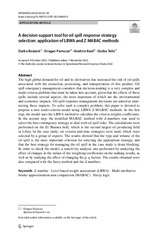Please use this identifier to cite or link to this item:
https://rfos.fon.bg.ac.rs/handle/123456789/2482Full metadata record
| DC Field | Value | Language |
|---|---|---|
| dc.creator | Božanić, Darko | |
| dc.creator | Pamučar, Dragan | |
| dc.creator | Badi, Ibrahim | |
| dc.creator | Tešić, Duško | |
| dc.date.accessioned | 2023-05-12T11:49:32Z | - |
| dc.date.available | 2023-05-12T11:49:32Z | - |
| dc.date.issued | 2023 | |
| dc.identifier.issn | 0030-3887 | |
| dc.identifier.uri | https://rfos.fon.bg.ac.rs/handle/123456789/2482 | - |
| dc.description.abstract | The high global demand for oil and its derivatives has increased the risk of oil spills associated with the extraction, processing, and transportation of this product. Oil spill emergency management considers that decision-making is a very complex and multi-criteria problem that must be taken into account, given that the effects of these spills include several aspects, the most important of which are the environmental and economic impacts. Oil spill response management decisions are aimed at minimizing these impacts. To solve such a complex problem, this paper is devoted to propose a new multi-criteria model using LBWA-Z MABAC methods. In the first step, the model uses the LBWA method to calculate the criteria weights coefficients. In the second step, the modified MABAC method with Z-numbers was used to select the best contingency strategy to deal with oil spill risks. The calculations were performed on the El Sharara field, which is the second largest oil producing field in Libya. In the case study, six criteria and nine strategies were used, which were selected by a group of experts. The results showed that the type and volume of the oil spill is the most important criterion for selecting the appropriate strategy, and that the best strategy for managing the oil spill in the case study is drain blocking. In order to check the model, a sensitivity analysis was performed by analyzing the effect of changes in the values of the weighting coefficients on the ranking results, as well as by studying the effect of changing the p, q factors. The results obtained were also compared with the fuzzy method and the Z numbers. | en |
| dc.publisher | Springer India, New Delhi | |
| dc.rights | openAccess | |
| dc.source | Opsearch | |
| dc.subject | Z number | en |
| dc.subject | Multi-attributive border approximation area comparison (MABAC) | en |
| dc.subject | Level based weight assessment (LBWA) | en |
| dc.subject | Fuzzy logic | en |
| dc.title | A decision support tool for oil spill response strategy selection: application of LBWA and Z MABAC methods | en |
| dc.type | article | |
| dc.rights.license | ARR | |
| dc.citation.epage | 58 | |
| dc.citation.issue | 1 | |
| dc.citation.other | 60(1): 24-58 | |
| dc.citation.rank | M24 | |
| dc.citation.spage | 24 | |
| dc.citation.volume | 60 | |
| dc.identifier.doi | 10.1007/s12597-022-00605-0 | |
| dc.identifier.fulltext | http://prototype2.rcub.bg.ac.rs/bitstream/id/922/2478.pdf | |
| dc.identifier.rcub | conv_2791 | |
| dc.identifier.scopus | 2-s2.0-85141177207 | |
| dc.identifier.wos | 000877430100001 | |
| dc.type.version | publishedVersion | |
| item.cerifentitytype | Publications | - |
| item.fulltext | With Fulltext | - |
| item.grantfulltext | open | - |
| item.openairecristype | http://purl.org/coar/resource_type/c_18cf | - |
| item.openairetype | article | - |
| Appears in Collections: | Radovi istraživača / Researchers’ publications | |
SCOPUSTM
Citations
11
checked on Nov 17, 2025
Page view(s)
12
checked on Dec 28, 2025
Download(s)
4
checked on Dec 28, 2025
Google ScholarTM
Check
Altmetric
Items in DSpace are protected by copyright, with all rights reserved, unless otherwise indicated.

